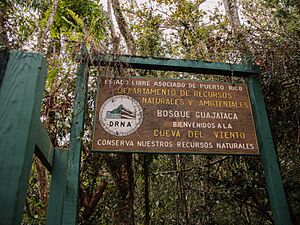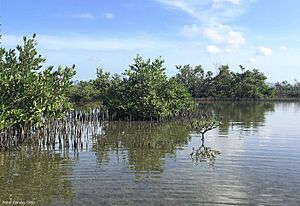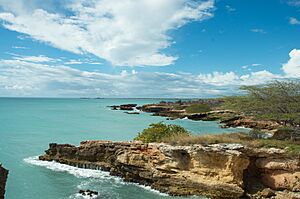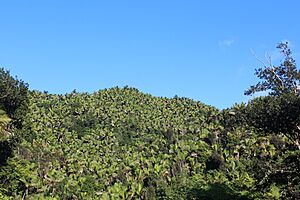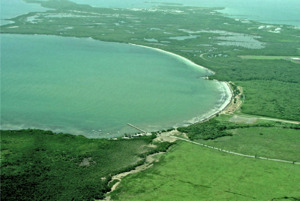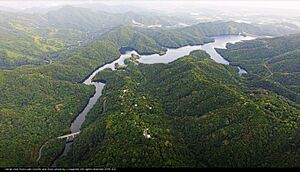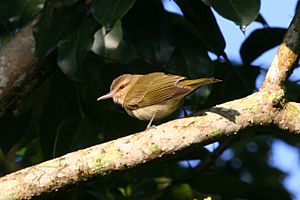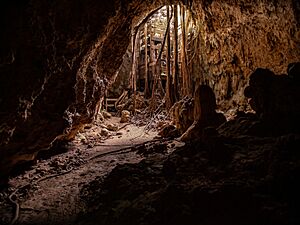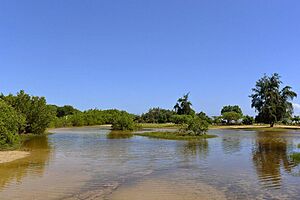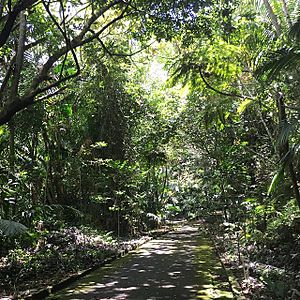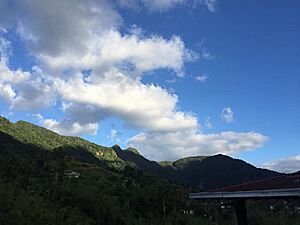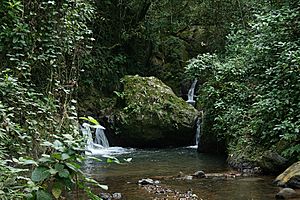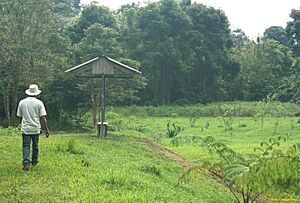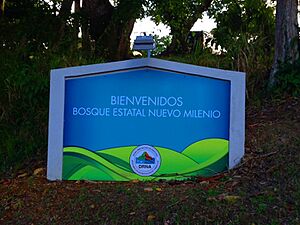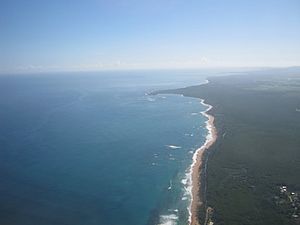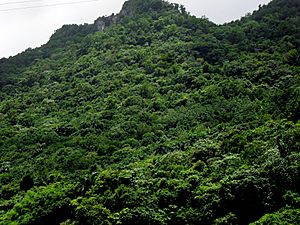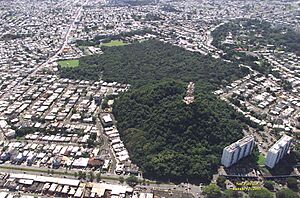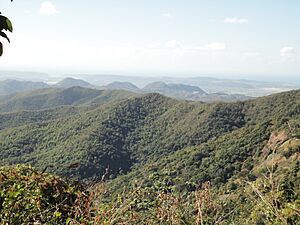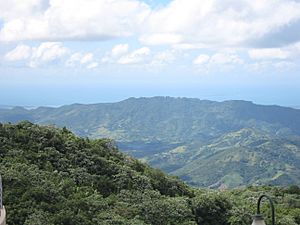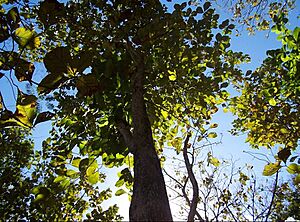List of Puerto Rico state forests facts for kids
Puerto Rico state forests are special protected areas of land in Puerto Rico. The government of Puerto Rico, specifically the Puerto Rico Department of Natural and Environmental Resources, takes care of them. Think of them like nature parks or reserves where forests are kept safe.
These forests are not just for protecting trees and animals. Many of them are also like state parks you might find in other places. This means they are great spots for fun activities like hiking, learning about nature, and enjoying the outdoors. Sometimes, a state forest can even have smaller, super-protected areas inside it, like the La Parguera Nature Reserve which is part of Boquerón State Forest. Right now, there are 20 of these amazing state forests in Puerto Rico!
How the Forests Were Protected
The very first protected forests in Puerto Rico weren't set aside because they were beautiful or full of wildlife. Instead, they were important for their wood! Back when Spain ruled Puerto Rico, these lands were called "Crown Lands" and were managed for timber. For example, El Yunque was one of the first areas to get this special status.
After the Spanish–American War in 1898, Puerto Rico became a territory of the United States. In 1903, President Theodore Roosevelt decided to protect these former timberlands. He named the Luquillo Forest Reserve, making it the first area in Puerto Rico protected for its nature.
Around 1918 and 1919, the local governor, Arthur Yager, started protecting important mangrove forests along the coasts. These included Aguirre, Boquerón, Ceiba, and Guánica. The Guánica forest was even made bigger to protect a large area of dry forest. This type of forest used to be common but was quickly disappearing. These became the first protected forests managed by the territory itself. Soon after, in December 1919, the Maricao Forest also became a protected area under the territorial government.
By 1935, many of Puerto Rico's protected woodlands were grouped together as the Caribbean National Forest. This included areas like the Sierra de Luquillo (which is El Yunque today) and parts of the Cordillera Central (like Guilarte and Toro Negro). Besides their natural beauty, these areas were also managed for tourism. During the 1930s, under President Franklin D. Roosevelt, many visitor centers and trails were built by the Civilian Conservation Corps. Many of these old buildings are now considered historical treasures! One famous example is the Santa Ana Observation Tower, often called La Torre de Piedra.
Over the years, more natural reserves like Carite, Guajataca, and Rio Abajo were also named state forests. Some forests, like Bosque del Pueblo, San Patricio, and Monte Choca, were even protected thanks to the hard work of local communities and groups!
List of Puerto Rico State Forests
Here is a list of the state forests in Puerto Rico:
| No. | State Forest | Image | Main Towns | Year Est. | Area (acres) |
Description and Activities |
|---|---|---|---|---|---|---|
| 1 | Aguirre | Guayama and Santa Isabel | 1918 | 2,390 | This forest has mangrove forests and includes the Punta Petrona Natural Reserve. It's next to the Jobos Bay National Estuarine Reserve. (B, F, G, K, O) | |
| 2 | Boquerón | Cabo Rojo and Lajas | 1918 | 4,630 | Features dry and mangrove forests, including the La Parguera Nature Reserve. It's a great place to see nature. (G, H, K, O, P, R, S, W) | |
| 3 | Cambalache | Arecibo and Barceloneta | 1973 | 1,019 | A moist forest with unique mogotes (karstic hills). A small part is open for visitors. (C, G, H, O, P, W) | |
| 4 | Carite | Caguas, Cayey, Guayama, Patillas and San Lorenzo | 1975 | 6,499 | A moist forest in the Sierra de Cayey mountains. It has popular recreational areas like Guavate and Charco Azul. (C, G, H, O, P, S, W) | |
| 5 | Ceiba | Ceiba and Fajardo | 1918 | 352 | A mangrove forest that includes the Medio Mundo and Daguao Protected Natural Area. (B, F, G, K, O, P, S) | |
| 6 | Cerrillos | Ponce | 1996 | 194 | A moist forest that surrounds Lake Cerrillos. (B, F, G, H, K, O, P, R, W) | |
| 7 | del Pueblo | Adjuntas | 1995 | 737 | A moist forest important for migratory birds. It's managed by a local community group called Taller de Arte y Cultura. (C, G, H, O, P, S, W) | |
| 8 | Guajataca | Isabela | 1943 | 2,286 | A moist forest with unique mogotes (karstic hills), many caves, canyons, and sinkholes. (C, G, H, O, P, W) | |
| 9 | Guánica | Guánica, Guayanilla, Yauco, Peñuelas and Ponce | 1919 | 10,670 | This is the largest protected dry forest in the Caribbean! It's home to rare and endangered animals like the Puerto Rican crested toad. It's also a UNESCO Biosphere Reserve. (G, H, K, O, P, R, S, W) | |
| 10 | Guilarte | Adjuntas, Peñuelas and Yauco | 1935 | 4,822 | A moist forest in the Cordillera Central mountains, around Monte Guilarte. It has many unique species, including the rare Monte Guilarte hollyfern. (G, H, O, W) | |
| 11 | Los Tres Picachos | Ciales and Jayuya | 1999 | 2,289 | A moist forest in the Cordillera Central, centered around Los Tres Picachos. It's an important area where different types of land meet. (H, O, W) | |
| 12 | Maricao | Maricao, Sabana Grande, San Germán | 1919 | 10,478 | This is the second largest rainforest in Puerto Rico! It has an ecological park, recreational areas, waterfalls, and a fish hatchery. (C, G, H, O, P, S, W) | |
| 13 | Monte Choca | Corozal | 2003 | 238 | A tropical moist forest. This forest is managed by a local community group in Palos Blancos. (G, H, O, R, W) | |
| 14 | Nuevo Milenio | San Juan | 1998 | 388 | An urban forest used for research, especially to study how hurricanes affect tropical forests. It's next to the University of Puerto Rico Botanical Garden. (R) | |
| 15 | Piñones | Carolina and Loiza | 1975 | 1,515 | This is the largest state-managed mangrove forest. It also has a subtropical forest, lagoons, sand dunes, and marine life. It's home to the rare araña tree. (C, G, K, O, P, R, S, W) | |
| 16 | Rio Abajo | Arecibo and Utuado | 1943 | 5,607 | A moist forest with mogotes (karstic hills), many caves, and sinkholes. It's a very important place for bringing back the Puerto Rican parrot. It's been a National Natural Landmark since 1980. (G, H, O, R, W) | |
| 17 | San Patricio | San Juan | 2000 | 68 | An urban forest used for studying how to reforest city areas. (G, O, R, W) | |
| 18 | Susúa | Sabana Grande and Yauco | 1935 | 3,241 | An important area where tropical dry forest meets tropical rainforest. It's home to the endangered Puerto Rican nightjar. (G, H, O, P, R, W) | |
| 19 | Toro Negro | Ciales, Jayuya, Juana Diaz, Orocovis and Ponce | 1934 | 7,968 | A moist forest in the Cordillera Central mountains, with some of the highest peaks in Puerto Rico, including Cerro de Punta. It has protected natural areas and places for recreation. (B, C, F, G, H, K, O, P, S, W) | |
| 20 | Vega | Vega Alta and Vega Baja | 1975 | 1,150 | A moist forest with mogotes (karstic hills). Only a small part is open to the public. (G, O, R, W) |
Key:
B = Boating
C = Camping
F = Fishing
G = Photography
H = Hiking
K = Kayaking
O = Nature Observation
P = Picnicking
R = Scientific Research
S = Swimming
W = Bird Watching
See also
- List of National Natural Landmarks in Puerto Rico
- List of U.S. National Forests
- Protected areas of Puerto Rico
 | Jessica Watkins |
 | Robert Henry Lawrence Jr. |
 | Mae Jemison |
 | Sian Proctor |
 | Guion Bluford |


